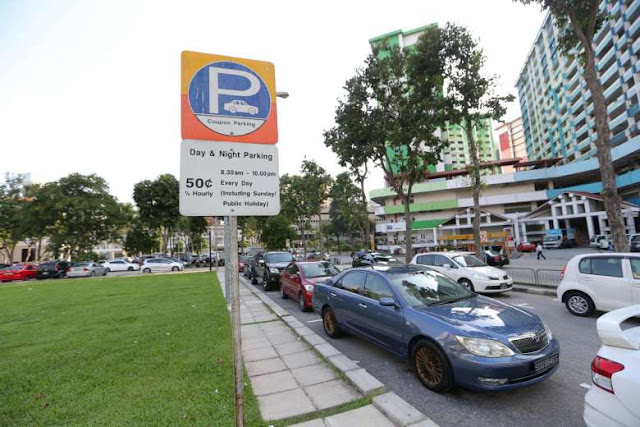Double standards for MPs on parking issue? Or is the jury still out?
by SEAN LIM
Previously, I expressed my disapproval over removing free parking for teachers, be it through social media or forum letters to The Straits Times. However, I stopped short of broaching the topic on parking by MPs in Parliament House, as I still had good faith that parliamentarians practised what they preached on the clean wage policy by dutifully paid their parking fees.
“Had” is the operative word because the revelation by Chua Mui Hoong in her Sunday Times column on MPs enjoying free parking at Parliament House left me feeling aghast of the perceived double standards practised on parliamentarians - be it PAP MPs, opposition MPs or NMPs/NCMPs. It blatantly goes against the move to eradicate free parking for teachers in school for the sake of “clean wage”.
The rationale that MPs “do not have offices in Parliament House and do not require full-time parking here”, as mentioned by the Clerk of Parliament in the article, does not justify the free parking.
Ordinary Singaporeans making trips to other premises on business have to pay for parking too, even though it is not their office. One example is how a businessman has to pay for parking when meeting clients at a shopping mall.
Moreover, according to a Channel Newsasia report, the duration of parliament sittings are increasingly longer. Adding on that Parliament House is situated in the city where high parking fees are the norm, the duration of free parking enjoyed by MPs is not insignificant.
It is unclear if the civil service clean wage policy applies to MPs. However, it is inconsequential as the spirit of clean wage, if deemed so important by the government, should be upheld across the board, regardless whether one is bounded by civil service rules.
The issue here is not whether the argument for free parking is flawed, but rather, whether it is worth riling up the status quo by slaughtering a sacred cow. It is not prudent to wake a sleeping lion.
After this column was published on Sunday, a reply by Grace Fu was published on Monday's edition of ST. The Leader of the House said "Elected MPs who drive pay for an annual permit that allows them to park in Housing Board carparks, in order to do their constituency work. This payment, which Parliament deducts from the MPs' allowances, is deemed to cover the occasions when they park at Parliament House to fulfil their duties."
That's the problem when you decide to crusade on such a controversial issue and wake the sleeping lion - a new can of worms is opened. Gaps remain on Ms Fu's explanation on MPs parking.
1. Granted, the annual permit is meant for them to park at Housing Board carparks, but how does this translate into coverage for parking in Parliament House? Just by reading her explanation, the logical conclusion I can gather is that the permit is meant for Housing Board parking only. It is akin to paying fees to have lessons at ABC tuition centre and then claim I have the right to attend lessons in other tuition centres by other companies just because I pay tuition fees at ABC tuition centre. I think we need clearer answers on that. Otherwise, can I argue that since teachers already paid for season parking in their Housing Board carparks, it is *deemed* to cover the cost of parking in schools? If this logic sounds ridiculous, it better be, because this is how Grace Fu's response sound like now.
2. Parking fees for Housing Board carparks may differ from that of Parliament House, if one wants to argue on market rate, since Parliament House is situated in town. So how can Singaporeans be convinced that there isn't any hidden perks for the permit, since parking in Parliament House is logically more expensive than in the heartlands.
3. What about NCMPs and NMPs who park in Parliament House? Do they pay for permit too? If no, does this constitute "hidden perks" too? Ms Fu only mentioned elected MPs in the House. If those NCMPs and NMPs do not need to purchase permits yet get to park at Parliament House for free, then it is something fishy worth investigating. Unless the government shed light on it - e.g. that they do pay for a permit to park at Parliament House, which then contradicts the Clerk of Parliament's statement in the initial Sunday Times column.
4. Can the government reveal the price of the permit these MPs pay annually? Should they make an effort to be more transparent? After all, Housing Board dwellers also pay for season parking, yet that doesn't give them a free pass to park at other Housing Board carparks (they can only park at their designated carpark as stated on the permit - correct me if I'm wrong, but I should be correct lah. I went to search on their website). If the prices of the permit and season parking do not differ much, then some explanation has to be done. Or is it the same old "Please trust your government that they are doing the right thing" narrative again? After what they have done for the past few years - I am too lazy and demoralised to produce a laundry list right now - I am not too sure if I still have the same level of trust for them.
5. Ms Fu seems to be prevaricating from the main issue. Mui Hoong was writing about parking in Parliament House, but I am puzzled why this has digressed to parking in ministries. The explanation on not paying to park at Parliament House was lacklustre and not convincing at all. It is, at best, a smokescreen on us Singaporeans.
6. Even if the permit fee for parking at Housing Board carparks does cover the parking cost at Parliament House, it still does not fulfil the "clean wage" concept. I am taking it at face value that the permit is exclusively meant for parking at Housing Board carparks. Housing Board and Parliament House are different institutions. It may jolly well cover the costs, but this isn't a case of "taking from the left pocket to put it in the right". If we want to account all the costs categorically, then it may appear to have discrepancies. Because technically, from my understanding of reading Grace Fu's response, fees paid are solely to Housing Board for the MPs parking via purchasing the permit. I'm not too sure if Parliament gets their share of fees paid to "cover the costs", because at face value, it doesn't appear to be so. It gives the impression on record that Parliament House still faces a "deficit" if it does not get "reimbursed" by Housing Board from permit fees collected. I do hope more light can be shed on this to prevent misunderstanding.
I think the main point that has yet to be addressed is how a permit meant for parking at Housing Board carparks can translate into non-payment for parking at Parliament House. It does not make sense. Unless the cost of their parking permit is significantly higher than what people normally pay for Housing Board parking, then perhaps Singaporeans will be convinced. Hence, it is to the government's advantage to be more transparent by breaking down the costs. Not good enough to say "Don't be kaypoh, don't ask so much. Just trust us".
I think one flaw of the government is the way they communicate. At times, they do have good intentions, but fail to convey the political message effectively. And sometimes, greater transparency over aspects like this may actually be in their favour, and who knows, increase public trust. It is no longer sufficient to just keep quiet and tell Singaporeans to "We are not going to tell you everything but please trust us to do our jobs".
After reading Grace Fu's reply, the jury is still out on whether MPs do enjoy free parking in Parliament House. The explanation by Clerk of Parliament and Grace's Fu's response do not seem to reconcile, at least intuitively. From my own reconstruction of this entire saga and reading Grace Fu's confusing response (which does not really clarify the matter), my own conclusion is that they enjoy this hidden perk - unless another response or report comes in again to debunk it clearly, once and for all.
Anyway, free parking for teachers was an unnecessary topic to be broached in the first place, since it is not significantly detrimental to our economy. Not like we are heavily in debt now because we have failed to collect parking fees from teachers over the years. Unfortunately, now this issue has digressed us from other important national issues, and also divided us.
Now that a can of worms is opened, eyes will be on the government to reconcile the issue. This is especially so when they seem to have lost moral authority over the clean wage argument, given the perceived double standards are applied to MPs vis-à-vis other public servants.
Note: There was a delay on my part to produce this response, in order to take in developments from Ms Grace Fu's reply on Chua Mui Hoong's Sunday Times column and analysing it.
Photo by: Ong Wee Jin from The Straits Times



Comments